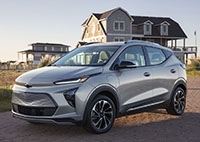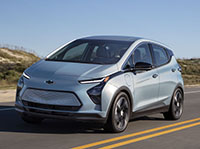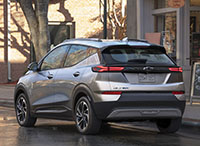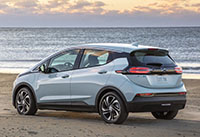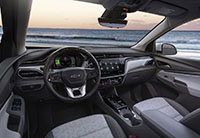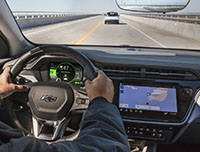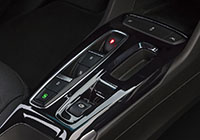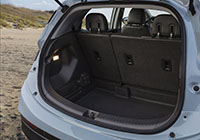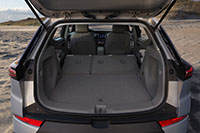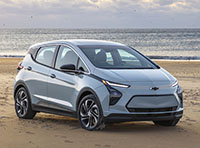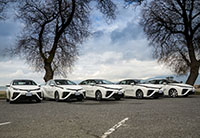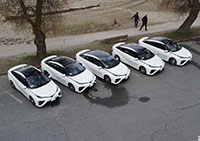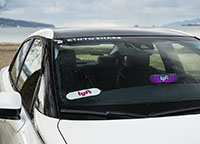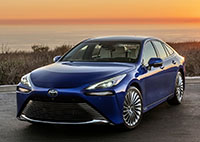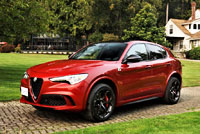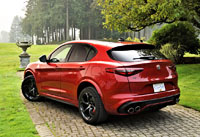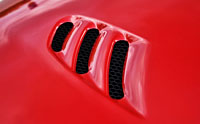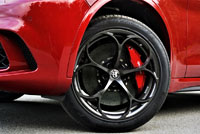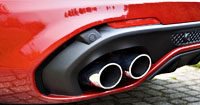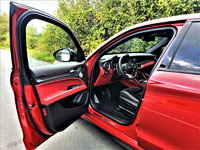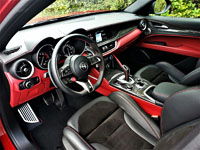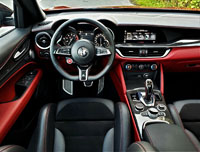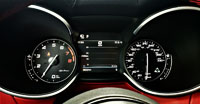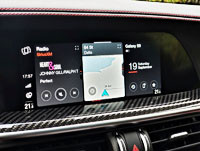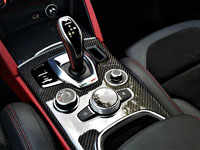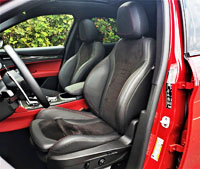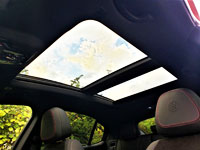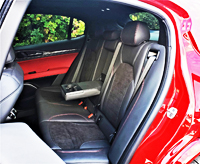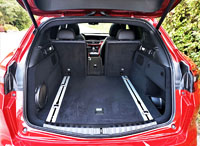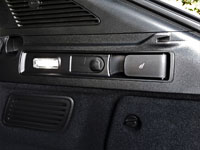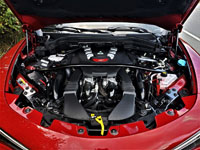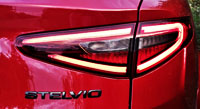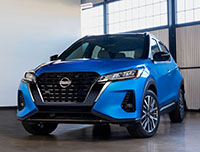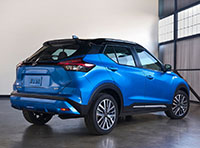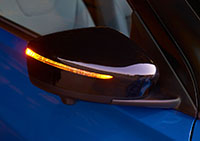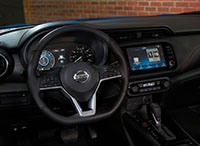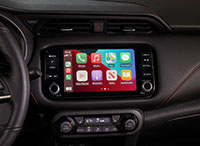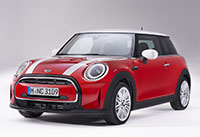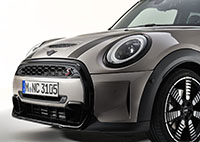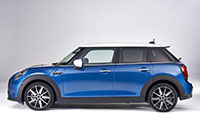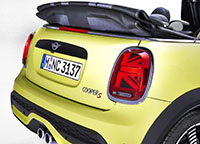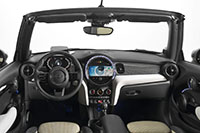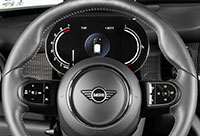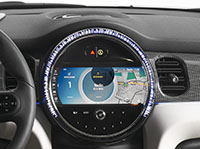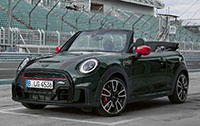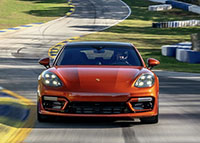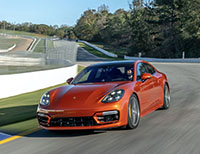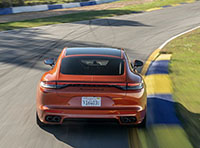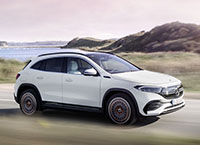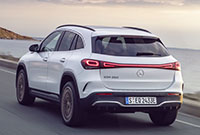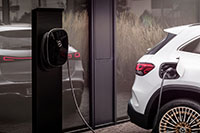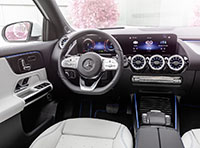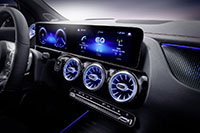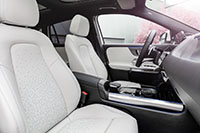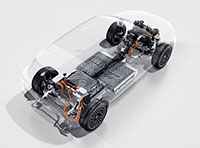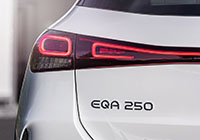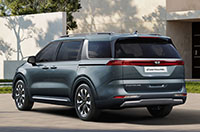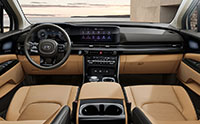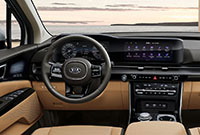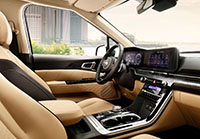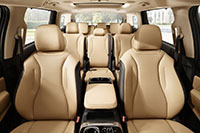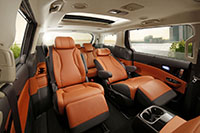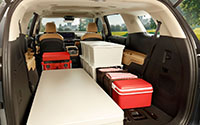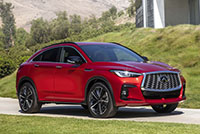
We can never say Infiniti is following the crowd by introducing its new QX55 crossover coupe. After all, the Japanese luxury brand helped define this niche market segment way back in 2002 when they unveiled the mid-size V6- and V8-powered FX35 and FX45. That strong-performing SUV would eventually transform into the even more dramatic QX70, and sadly be discontinued after the 2017 model year. It remains a great used buy for those wanting a true coupe-like “sport” utility featuring elegant finishings inside.
Infiniti is now re-entering the SUV coupe-style sector for 2022 with the QX55, and being that it rides on the Japanese luxury brand’s top-selling QX50 compact crossover, and therefore priced lower than the QX70 was, it should find more buyers.
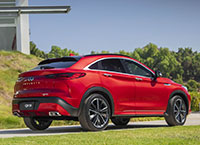
The new QX55 is for those who want something a bit sportier than the QX50, but more practical than the Q50 sedan or Q60 sports coupe. Sure, rear passengers need to give up a little headroom, while its cargo compartment is slightly smaller, but nothing in life is without compromise, and the QX55 delivers big in many other ways.
To be clear, the QX55 loses 134 litres of cargo capacity when compared to the QX50, which leaves 761 litres compared to 895. Sliding the rear seats forward can increase dedicated luggage space, but this versatility is unoptimized by less-than-ideal 60/40-split rear seatbacks, compared to European competitors that provide the more convenient 40/20/40 rear seat split that allows longer items, like skis, to be laid down the middle while two rear passengers enjoy the more comfortable rear window seats.
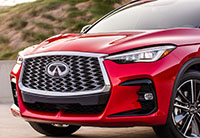
Those competitors include a few well-proven contenders, such as the BMW X4 that started the entire compact SUV coupe segment off in 2014. It was followed in 2018 by Mercedes’ GLC Coupe, while the Audi Q5 Sportback is entirely new for 2021. Now Infiniti hits the market as the first non-German luxury brand to offer an SUV coupe.
To be fair, some compact luxury rivals look similarly swank, including the Alfa Romeo Stelvio, Jaguar F-Pace, Range Rover Velar, Porsche Macan and Tesla Model Y, so they could very well vie for SUV coupe-like contention, but being the only compact models offered by their respective luxury brands, and providing similar passenger and cargo volumes to their more conventional category challengers, we’ll leave them off the list. They deserve honourable mentions, however, as does Genesis’ soon-to-arrive GV70.
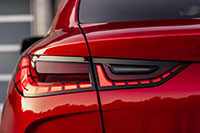
The new QX55 can arguably be called the most attractive crossover in Infiniti’s shrinking SUV lineup (after they cancelled the QX70 they also nixed the subcompact QX30). It offers up a sizeable interpretation of Infiniti’s stylish double-arched grille, a standard set of slim LED headlamps, which Infiniti says “mimic the human eye,” plus gloss-black fog light bezels that look similar to brake cooling ducts. The look is imposing, yet classy.
Continuing rearward, dwn the QX55’s curvaceous side surfaces and arching roofline flow into a short rear deck lid, the latter said to be a “fresh interpretation of the FX silhouette” by Infiniti. It combines for a neat and tidy hind end, highlighted by “piano key” style tail lamps boasting 45 separate LEDs for quite the dazzling display after hours.
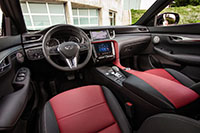
Black cladding trims off the SUV’s lower extremities, of course, running from the front wheel arches backward, sweeping upwards when reaching the rear bumper in order to outline a body-colour diffuser-style panel packed full of chromed rectangular exhaust pipes. It’s a handsome design that should be popular with those wanting something slightly more daring from a brand known to be more dependable than its European competitors.
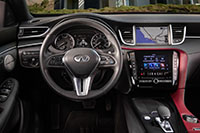
Behind its elegant grille is the same variable-compression 2.0-litre turbocharged four-cylinder engine found in the QX50, in which it makes 268 horsepower and 280 lb-ft of torque. It’s conjoined to a continuously variable transmission (CVT) with steering wheel paddles, which while efficient and reliable, is rarely a performance fan’s first choice. Canadian examples feature standard AWD, while its fuel economy is slightly lower than the QX50’s at a claimed rating of 10.5 L/100km city, 8.3 highway and 9.5 combined.
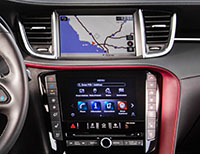
Like the engine and drivetrain, the QX55’s cabin hardly deviates from its more conventionally shaped sibling, other than the top-tier Sensory model’s lack of quilted leather upholstery. Seeming to be trying for a sportier theme, this model gets optional two-tone Monaco Red and Graphite black detailing, joined by additional red accents on the centre stack and lower console, which truly highlights the unique shape of this technology-filled cabin divider. Additionally, this swath of bright colouring gets offset by dark grey, open-pore wood trim on the dash and door panels, while these pieces butt up against satin-finish aluminum trim that combines with yet more nicely finished metal throughout the cabin.
The Japanese brand’s InTouch 8.0- (upper) and 7.0-inch (lower) dual digital displays are once again front and centre, which is a sharp contrast to most premium rivals that house their main screens like upright fixed tablets on the dash top. This choice allows for touch capacitive use along with most peoples’ preferred smartphone-style tap, swipe and pinch finger gestures, while redundant controls are located on the steering wheel spokes. The QX55 will come standard with all expected infotainment functions too, such as Android Auto, Apple CarPlay, and 4G LTE wi-fi connectivity for up to seven devices.
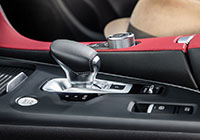
The QX55 just went on sale with three available trim levels. The first is Luxe, which at $51,995 plus freight and fees includes standard AWD, 20-inch alloys, leatherette upholstery, dark aluminum interior trim, heated front seats, a powered glass sunroof, active noise cancellation, and a bevy of advanced driver assistive systems like predictive forward collision warning, forward emergency braking with pedestrian detection, automatic rear braking, blind spot warning, lane departure warning, rear cross-traffic alert, and automatic high beams.
Upgrade to $56,998 Essential ProAssist trim and you’ll get adaptive front LED headlights, an overhead surround parking camera with moving object detection, adaptive cruise control, distance control assist, blind spot intervention, and lane departure prevention, while additional features include InTouch navigation, a Bose audio system with 16 speakers, and leather upholstery.
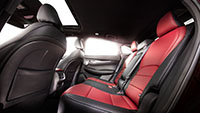
As mentioned earlier, Sensory is the top-line trim in the QX55 hierarchy, which at $60,998 features plusher semi-aniline leather upholstery, the previously noted open-pore maple wood accents, three-zone auto HVAC, ambient cabin lighting, and a motion-activated liftgate, while this model’s tech systems are further improved with a head-up display, traffic sign recognition, full speed range and hold capabilities for the adaptive cruise control, ProPilot Assist semi-self-driving with steering assist, and finally, Infiniti’s exclusive drive-by-wire Direct Adaptive Steering system.
Infiniti’s new crossover luxury coupe faces some serious competitors, mostly because its brand name doesn’t provide the same premium cachet as more established marques like Audi, BMW and Mercedes-Benz. Nevertheless, the QX55 provides impressive good looks, similar levels of luxury, competitive technology and strong performance, while the new QX55’s value proposition should be a deal-maker for those concerned about their monthly payments.
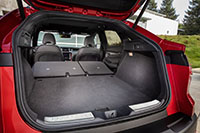
Saving money in mind, Infiniti is already offering up to $1,500 in additional incentives for the new QX55, as seen on our pricing page, where you can choose one of its three trims and configure it to your liking. Find out how you can save thousands when buying your next vehicle by becoming a CarCostCanada member, and be sure to download our free CarCostCanada app as well, so you can get info on the latest factory rebates, newest manufacturer financing and leasing deals, and dealer invoice pricing that will make negotiating your best deal ultra-easy.
Story credits: Trevor Hofmann
Photo credits: Infiniti

